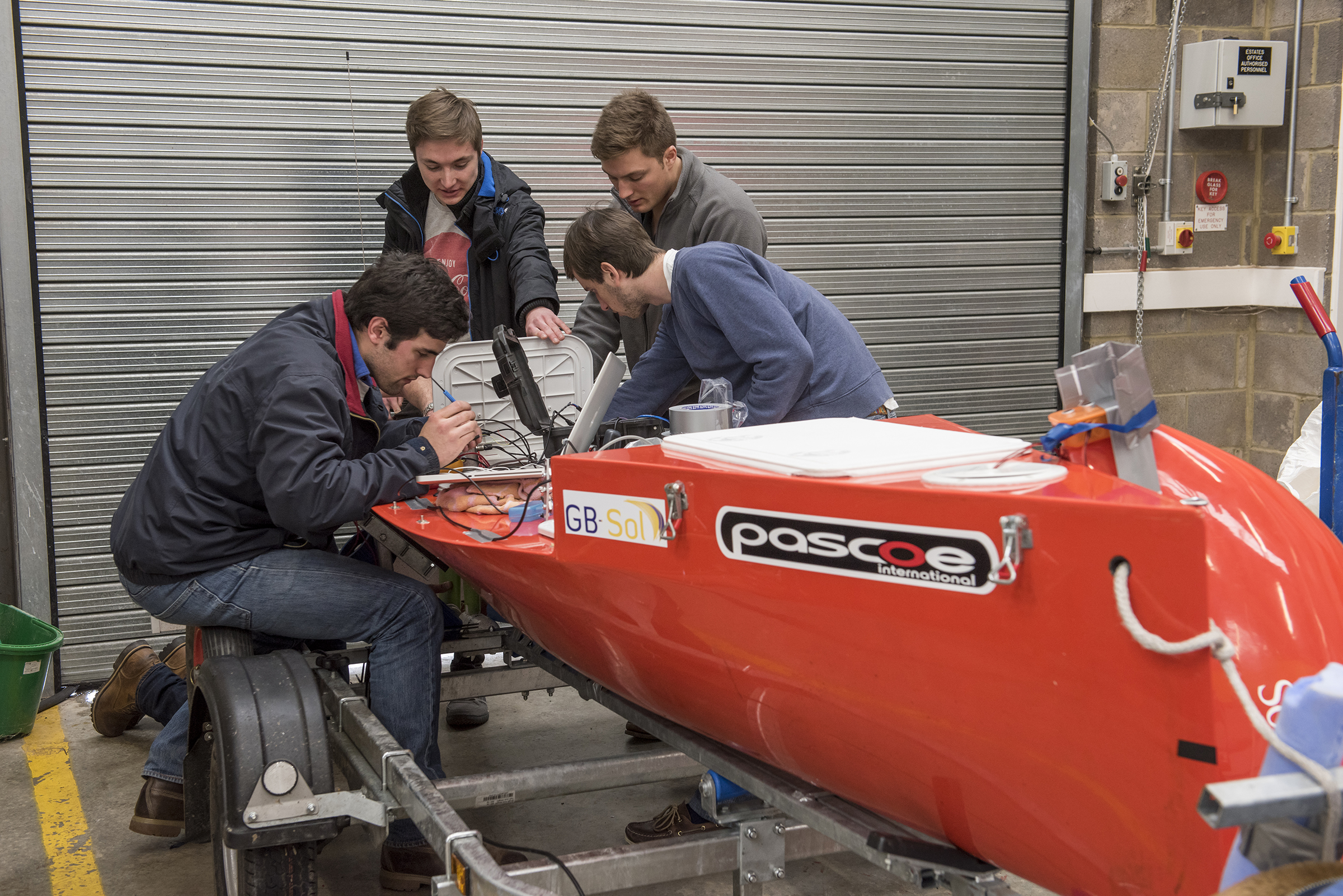
“Britain’s great strength is its innovative design and engineering natural ability…” – James Dyson
Workers in the fields of Science, Engineering and Technology (SET) are crucial for the preservation of innovation on a global scale, and are also vital to the maintenance of the UK’s strong economy.
With over 1.7 million people employed in the nation’s specialised sector, the UK’s Engineering industry is undeniably booming, meaning a wealth of opportunity for graduates from the most progressive engineering schools in the country.
“Our focus is on the development of engineering and scientific knowledge and understanding how it can be applied to solve the major challenges facing society now and in the future,” says William Powrie, Dean of the Faculty of Engineering and the Environment at the University of Southampton, an example of one of the UK’s specialised engineering schools with a history of innovation that spans almost three centuries. Through its use of sound scientific theory and creative engineering processes, Engineering and the Environment at Southampton has helped shape the world as we know it.
“Our education and research is led by internationally renowned academics using a wide range of state-of-the-art experimental and computational facilities,” Powrie concludes.
Innovation is central to growth; through the combination of scientific principles and intricately executed research, the facets of higher education dedicated to the field of engineering present us with new, innovative processes that in turn create new ways for us to acquire knowledge.
![]() Image via Shutterstock
Image via Shutterstock
Both the development and institutionalisation of engineering pathways within universities are what drives talent behind the world’s key engineering markets – and it seems that UK universities provide the majority of talent.
Even when we go as far back as 1882, we can see the positive effects that innovative providers of engineering education, such as Southampton, have had on wider society. In that very year, for example, when the institution was still known as the Hartley Institute, it educated a very talented young engineer called Frederick Lanchester, a man who would become known as the pioneer of automotive engineering. Upon leaving the university, Lanchester carved his name in history for a number of ground-breaking reasons, including designing and building one of the first petrol driven four-wheeled cars in 1895; developing the first full theory of lift and drag; his research into aircraft stability; as well as for inventing the disc brake.
“By sharing the latest knowledge, ideas and techniques, we can help you develop your skills, strengths and thinking and enable you to stay up to date with the latest developments in the field,” the Engineering Faculty declares.
“We are at the leading edge of new ideas and forward-thinking research.”
Read on to learn more about the UK’s most progressive Engineering Schools…
FACULTY OF ENGINEERING AND THE ENVIRONMENT, UNIVERSITY OF SOUTHAMPTON
Engineering and the Environment at the University of Southampton is known as a world-class centre for education, research and enterprise. As the largest, most innovative and most diverse engineering, environmental science and audiology grouping in the UK, Southampton’s elite expertise extends well beyond the Earth’s crust, reaching deep into space and covering everything in between.
Not only does this school have high impact on society with the execution of cutting-edge research, it also directly feeds industry with creative solutions to their problems by training engineers, and consistently producing work-ready graduates.
![]() Image courtesy of the University of Southampton
Image courtesy of the University of Southampton
The university boasts a wealth of world-class undergraduate, postgraduate and research options in fields like:
- Acoustical Engineering
- Aeronautics and Astronautics
- Civil Engineering
- Electronics and Computer Science
- Maritime Engineering and Ship Science
- Mechanical Engineering
This broad portfolio of globally-recognised, comprehensive degree programmes gives students the invaluable chance to specialise in a particular field of engineering.
In addition to this, the school provides a number of quality short courses, and can also put together bespoke learning programmes specifically tailored to your line of work, company or organisation.
FACULTY OF ENGINEERING, UNIVERSITY OF BRISTOL
Engineering at the University of Bristol is committed to producing the leaders and entrepreneurs of the future, as well as to advancing the knowledge and technological innovations needed to address challenges currently faced by the world.
With its status as a Russell Group institution, the University of Bristol is recognised as one of the most esteemed higher education providers in the UK, and remains proud of its interdisciplinary culture and lasting global partnerships with industry. The university consistently applies its research through successful technology and knowledge transfer, and its work is always engaged with the industry, allowing them to add value to both the national and global economy.
The university provides a comprehensive education at all levels in:
- Aerospace Engineering
- Civil Engineering
- Computer Science
- Electrical and Electronic Engineering
- Engineering Mathematics
- Mechanical Engineering
Bristol’s highly practical and relevant engineering disciplines empower its students to think creatively and challenge existing practice. This nurtures a culture of enterprise, and provides the world with graduates who are best equipped to succeed in a career of their choice.
![]() Image via Suhtterstock
Image via Suhtterstock
FACULTY OF ENGINEERING SCIENCES, UNIVERSITY COLLEGE LONDON (UCL)
UCL’s Engineering Faculty is uniquely international, ultimately reflecting the university’s global outlook. Students and staff come from over 120 nations across Europe, the Americas, Africa, India, China, the Middle and Far East, and Australasia – as do its academic and business partners – to create one of the UK’s most exciting engineering schools.
UCL provides world-class degrees at the undergraduate, postgraduate and research levels, and in fields such as:
- Biochemical Engineering
- Chemical Engineering
- Civil, Environmental and Geomatic Engineering
- Computer Science
- Electronic and Electrical Engineering
- Mechanical Engineering
- Medical Physics and Biomedical Engineering
UCL’s excellent academic reputation, and expertise across the breadth of engineering – from traditional subjects such as naval architecture, to new interdisciplinary explorations in crime science and digital humanities – is reflected in both its rankings and its funding portfolio.
SCHOOL OF ENGINEERING, UNIVERSITY OF EDINBURGH
The School of Engineering at the University of Edinburgh is one of the largest the university has to offer, comprising 150 staff and over 350 postgraduate, 140 MSc and 1,400 undergraduate students. It occupies around 10,000 m2 in over 10 buildings on the university’s beautiful King’s buildings site in South Edinburgh.
The university’s taught Engineering disciplines include:
- Chemical Engineering
- Civil and Environmental Engineering
- Electronics and Electrical Engineering
- Mechanical Engineering
- General Engineering
Engineering has been taught at Edinburgh since 1673; since then, the school has grown in leaps and bounds with over 1,300 students studying both undergraduate and postgraduate courses, all of whom are taught by around 85 permanent members of expert staff and a number of visiting academics that are globally-reputed.
![]() Image courtesy of the University of Birmingham
Image courtesy of the University of Birmingham
COLLEGE OF ENGINEERING AND PHYSICAL SCIENCES, UNIVERSITY OF BIRMINGHAM
The College of Engineering and Physical Sciences comprises seven academic schools working across the broad frontiers of science and engineering in education, research and translating knowledge. The college is one of the largest groupings in Europe, bringing the spheres of physical science and engineering into one.
Birmingham’s seven schools of Engineering consist of:
- Chemical Engineering
- Chemistry
- Computer Science
- Engineering
- Mathematics
- Metallurgy and Materials
- Physics and Astronomy
With its focus and contribution to society centred around three core themes of the Science Frontiers, Advanced Manufacturing and Resilience, and Energy and Sustain inability, Birmingham draws students from all four corners of the globe as they work towards some of the university’s remarkable achievements, and push for a brighter, better global society.
*Some of the institutions featured in this article are commercial partners of Study International
Feature image courtesy of the University of Southampton
Liked this? Then you’ll love these…
Leading North American Engineering Universities
The role of university research in tackling social challenges and driving economic growth




 Image via Shutterstock
Image via Shutterstock Image courtesy of the University of Southampton
Image courtesy of the University of Southampton Image via Suhtterstock
Image via Suhtterstock Image courtesy of the University of Birmingham
Image courtesy of the University of Birmingham


